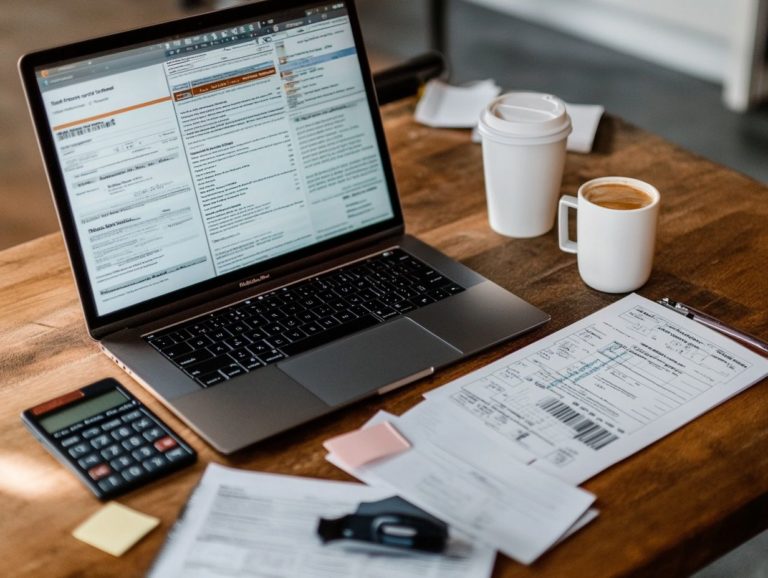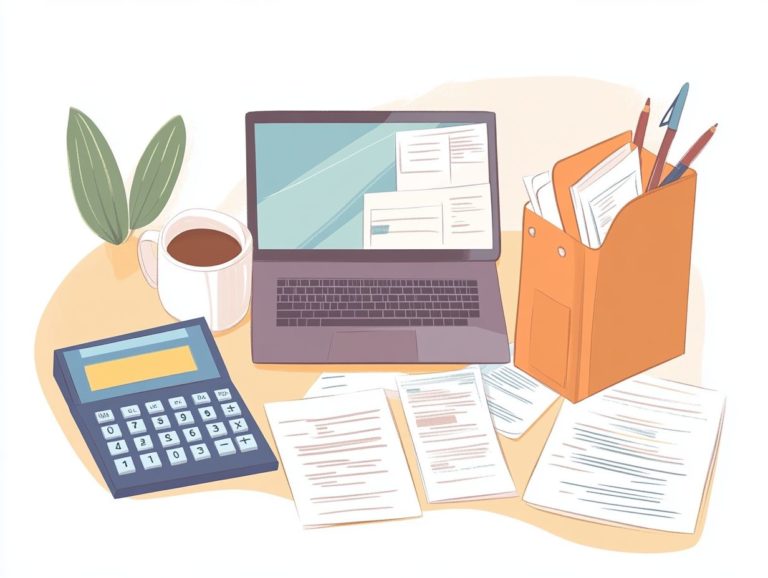5 Common Tax Questions About Freelancing
Freelancing provides great freedom, yet it brings a distinct array of tax challenges that can feel daunting. Understanding your tax obligations isn’t just beneficial; it’s essential for maintaining compliance and maximizing your deductions.
This article delves into five prevalent questions freelancers frequently ponder, ranging from whether you need to pay taxes to which expenses you can deduct. It also offers vital insights on filing tips, self-employment taxes, and effective tax strategies to sidestep penalties.
Whether you’re embarking on your freelancing journey or are already seasoned in the field, this guide will equip you to easily handle the complex tax rules that come with freelancing.
Contents
- Key Takeaways:
- 1. Do I Need to Pay Taxes as a Freelancer?
- 2. What Expenses Can I Deduct as a Freelancer?
- 3. How Do I File Taxes as a Freelancer?
- 4. What Is the Self-Employment Tax?
- 5. How Can I Avoid Tax Penalties as a Freelancer?
- What Are the Benefits of Being a Freelancer?
- What Are the Different Types of Taxes I Need to Consider as a Freelancer?
- What Are the Key Deadlines for Freelancers When It Comes to Taxes?
- How Can I Keep Track of My Income and Expenses as a Freelancer?
- What Are the Best Practices for Freelancers When It Comes to Taxes?
- What Are the Tax Implications of Working with International Clients as a Freelancer?
- Frequently Asked Questions
Key Takeaways:

- As a freelancer, you are responsible for paying taxes on your income. You can save a lot of money by keeping track of your earnings and expenses.
- Freelancers can deduct business-related expenses such as office supplies, advertising expenses, and travel expenses. Keeping documentation of these expenses can help reduce your taxable income.
- Filing taxes as a freelancer can be done through self-employment tax forms and schedules. Know the tax laws and deadlines to avoid penalties.
1. Do I Need to Pay Taxes as a Freelancer?
As a freelancer in the United States, you hold the responsibility of paying taxes on your freelance income, which involves various legal obligations to the IRS. Understanding your tax responsibilities is essential to avoid penalties during tax season.
Your freelance income can come from various sources, including payments for services rendered, commissions, and even royalties. If you earn over $600 from a single client, you typically need to receive a 1099-MISC form, which serves as a reminder to maintain meticulous records.
Beyond recognizing what qualifies as taxable income, it’s crucial for you, as a self-employed individual, to understand the intricacies of IRS regulations. This includes allowable deductions and the need for estimated tax payments. By navigating these rules skillfully, you can minimize potential financial pitfalls and ensure compliance with your tax obligations, ultimately paving the way for a more sustainable and profitable business.
2. What Expenses Can I Deduct as a Freelancer?
Freelancers have a valuable opportunity to decrease their taxable income by claiming a range of tax deductions, including essential business expenses such as home office costs, health insurance premiums, and travel expenses. It s vital for you to grasp what qualifies as deductible expenses.
If you designate a specific area of your home exclusively for business use, you can often deduct those home office costs. You might deduct health insurance premiums if you pay for them out of pocket and they cover your family members as well.
Travel expenses incurred during client meetings, purchases, or research can also be claimed, provided they are directly connected to your business activities.
Meticulous documentation of these expenses is critical; maintaining clear records like receipts, invoices, and logs will ensure you have adequate proof when it s time to submit your tax returns. Effective record-keeping not only supports your claims but also streamlines the filing process, making it easier for you to manage your finances with confidence.
3. How Do I File Taxes as a Freelancer?
Filing taxes as a freelancer requires you to grasp the unique demands of the IRS, including submitting estimated taxes and selecting the right software, like TurboTax, or engaging a freelance accountant for expert advice.
Start tracking your income and expenses now! Diligently throughout the year this meticulous record-keeping will be invaluable come tax season. It’s essential to determine if you need to pay estimated taxes quarterly, particularly if you expect to earn above a certain income threshold.
Preparing your tax returns can become a breeze with user-friendly tax software that often offers step-by-step guidance, ensuring that nothing slips through the cracks. Hiring an experienced freelance accountant provides tailored insights that align closely with your specific financial situation, ultimately enhancing your strategic tax planning.
4. What Is the Self-Employment Tax?

The self-employment tax is an important part for freelancers and independent contractors. It includes both Social Security and Medicare taxes, which can significantly affect your income tax responsibilities.
This tax is different from regular employment taxes. As a self-employed person, you pay both the employer and employee portions, resulting in a higher tax rate.
You must plan carefully to avoid surprises later. Set aside enough money for tax payments throughout the year to help you avoid unwelcome surprises at tax time.
Consider these effective strategies:
- Make estimated tax payments quarterly.
- Keep detailed records of business expenses to maximize deductions.
- Consult a tax professional to understand your tax requirements.
Incorporate self-employment tax into your broader financial planning. It affects not just your cash flow, but also your retirement savings and benefits eligibility.
5. How Can I Avoid Tax Penalties as a Freelancer?
Avoiding tax penalties as a freelancer demands diligent record keeping and a proactive approach to estimated taxes. Ensure you meet your tax obligations well ahead of the looming tax season deadline.
One effective strategy is to regularly set aside funds specifically for those estimated taxes. This spares you from the last-minute scramble that can lead to stress and mistakes.
Meticulous records of your income and expenses not only aid in calculating potential deductions but also simplify the filing process immensely.
Stay informed about the latest IRS regulations and tax codes, as these can frequently change and catch you off guard. You can gain valuable insights by working with a tax professional or attending informative seminars.
Leveraging accounting software can significantly streamline your financial tracking, making it easier to manage your finances.
What Are the Benefits of Being a Freelancer?
Embracing a freelance lifestyle offers you a wealth of benefits, including flexible work arrangements and the freedom to select your professional services. There are potential tax advantages that can elevate your financial planning, including health insurance through the Affordable Care Act.
This flexibility allows you to tailor your schedule around personal commitments, resulting in an improved work-life balance that many find invaluable.
As a freelancer, you can boost your income through various business deductions. These deductions enable you to reduce your taxable income and maximize your profits.
By using smart tax strategies like deducting home office expenses or travel costs you can significantly enhance your overall financial health.
Therefore, it’s not merely about working independently; it’s about crafting a sustainable and fulfilling career that aligns with your lifestyle aspirations.
What Are the Different Types of Taxes I Need to Consider as a Freelancer?
Navigating the world of freelancing means dealing with several types of taxes, including income tax, self-employment tax, and estimated taxes. Each of these comes with its own set of considerations that are essential for your financial planning.
Understanding these tax types is vital, as they have a direct impact on your net income and overall financial health.
Income tax stems from the earnings you generate through your freelance work. It fluctuates based on your total income level.
Self-employment tax covers your Social Security and Medicare obligations. You must handle this yourself since there’s no employer to withhold these taxes on your behalf.
Estimated taxes require you to project your income throughout the year and make quarterly payments to dodge any penalties. With proper planning and consultation with tax professionals, you can craft an effective strategy to manage these financial responsibilities like a pro.
What Are the Key Deadlines for Freelancers When It Comes to Taxes?

Understanding key tax deadlines is essential for freelancers. Staying compliant with IRS regulations helps you avoid penalties.
Be alert about these dates as they impact your financial well-being and stress levels. Missing deadlines can lead to late fees, interest charges, or even audits.
Your estimated tax payments are due on the following dates:
- April 15th: A key date for freelancers to pay estimated taxes.
- June 15th: Another crucial deadline to manage your taxes.
- September 15th: Stay diligent this date requires your attention.
- January 15th of the following year: The final deadline for estimated taxes.
It’s crucial to keep track of these important dates! Filing your income taxes requires careful documentation and preparation.
Consider setting reminders or using tax tips that help self-employed individuals. Tax software, like TurboTax or Hiveage, can make the process easier and ensure you claim all possible deductions.
How Can I Keep Track of My Income and Expenses as a Freelancer?
Effective record keeping is vital for freelancers. It helps you accurately track income and expenses, like business meals and medical costs that can be deducted.
To simplify this, use financial management tools designed for freelancers. Software like QuickBooks and FreshBooks can help you manage expenses efficiently.
Stay organized by categorizing expenses in real time. Maintaining digital receipts is also important for effective bookkeeping.
Set aside time each week to review your financial records. This proactive approach gives you a clearer picture of your financial health.
This kind of planning makes year-end reporting much less daunting!
What Are the Best Practices for Freelancers When It Comes to Taxes?
Adopting best practices for tax management, particularly tailored for freelancers can greatly benefit you as a freelancer. This includes setting up easy bookkeeping systems that cater to the unique needs of self-employed individuals, and maximizing your tax deductions.
By organizing your financial documents, including 1099-MISC forms and accurately categorizing your expenses, you can streamline your tax filing process, ultimately saving time and reducing stress when tax season rolls around. Understanding specific tax incentives, such as the 5 tax credits freelancers shouldn’t miss and foreign income exclusion, is important for digital nomad freelancers, and can lead to substantial savings.
It s wise to set aside a portion of your income for tax obligations throughout the year, ensuring you are well prepared to meet your tax obligations when tax time arrives.
Regular consultations with a tax professional can help clarify complex tax issues and enhance your financial strategy, ensuring you effectively utilize any newly available credits or deductions as tax benefits for freelancers.
What Are the Tax Implications of Working with International Clients as a Freelancer?
Working with international clients as a freelancer presents unique tax implications that you need to navigate thoughtfully. You may find yourself eligible for foreign income exclusion, but it s crucial to accurately report your earnings on your tax returns to the IRS.
Understanding that income earned from foreign clients might fall under different reporting rules is essential, and navigating this landscape can be complex. Each country has its own tax regulations, which may require you to file additional forms or even pay taxes abroad. Depending on where you reside, tax treaties might exist to help manage tax obligations and avoid double taxation, but they often demand careful documentation.
By keeping meticulous records of all transactions and consulting with a tax professional who specializes in international tax law, you can effectively manage your tax obligations and ensure compliance both in your home country and any foreign jurisdictions.
Frequently Asked Questions

What is freelancing?
Freelancing is a type of work arrangement where an individual offers their services to clients on a project-by-project or contract basis, rather than being employed by a single employer.
Do I need to pay taxes as a freelancer?
Yes, as a freelancer, you are considered self-employed and must pay taxes on your income, just like any other business owner.
What taxes do I need to pay as a freelancer?
The main taxes you need to pay as a freelancer are income tax, self-employment tax, and possibly state and local taxes. You may also be responsible for paying quarterly estimated taxes.
How do I report my freelance income?
You will need to report your freelance income on your annual tax return. You may also need to file additional forms, such as Schedule C or Schedule SE, depending on the structure of your business.
Can I deduct business expenses as a freelancer?
Yes, as a freelancer, you can deduct certain business expenses related to your work, such as office supplies, equipment, and travel expenses. However, be sure to keep accurate records and only deduct expenses that are necessary and directly related to your freelance work.
Do I need to collect and send sales tax as a freelancer?
If you sell taxable products or services, you must collect and send sales tax to the right agencies. Don t risk penalties make sure you understand your local tax laws!
Not all goods and services are subject to sales tax. It’s important to research the tax laws in your area.






